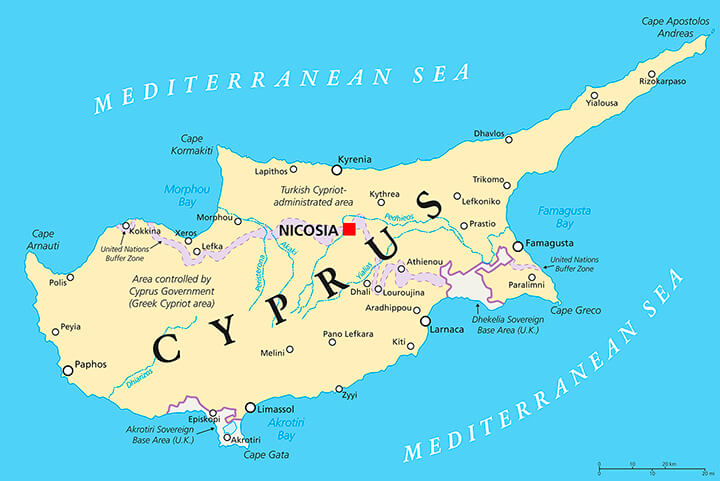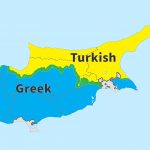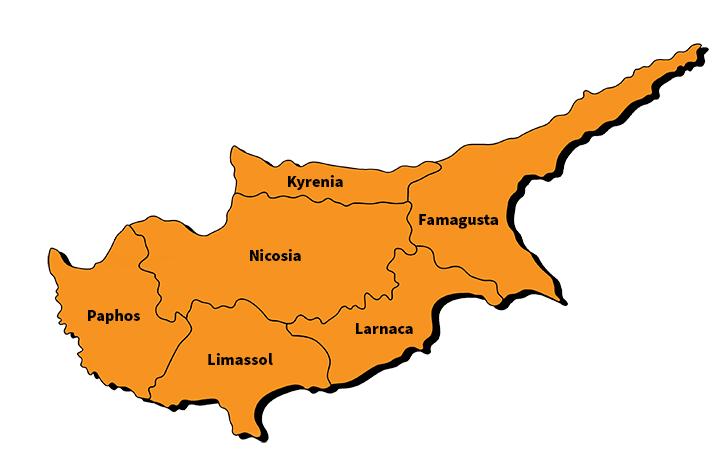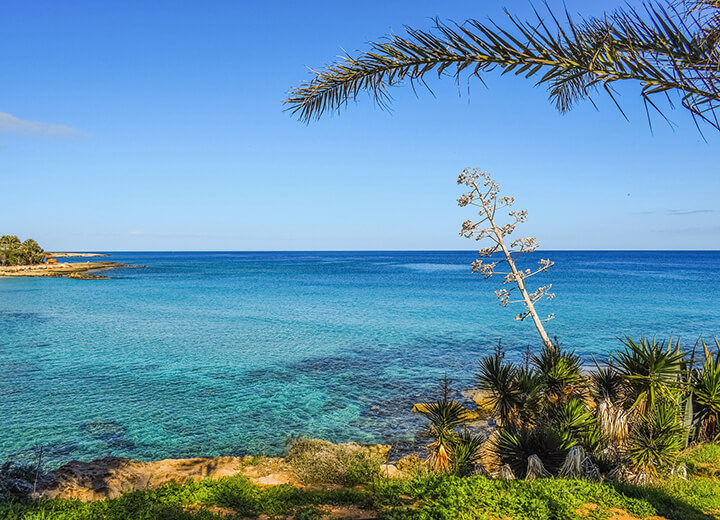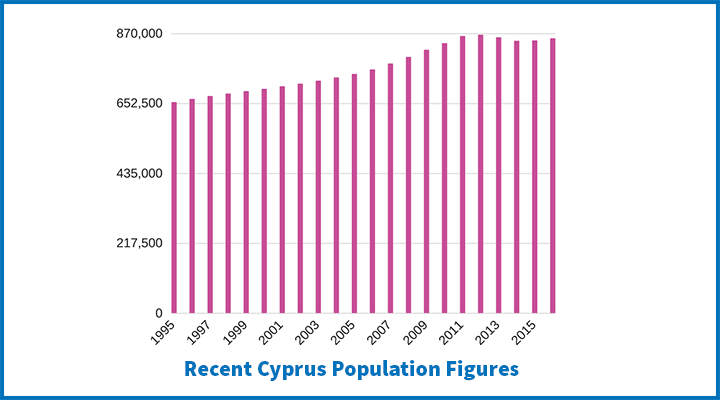Cyprus took over The Presidency of the Council of the European Union from July to December 2012. A website was set up where you could follow the Presidency activities and get information. The International Conference Centre and the Philoxenia Hotel in Nicosia were renovated to form the heart of the EU Presidency.
The Philoxenia Hotel provided space to hold up to 350 reporters and was equipped with facilities to allow news reporters to connect to their own country’s television stations. The International Conference Centre mainly hosted meetings at ministerial level and included restaurants and cafeterias.
The Island’s Partitions
The Republic of Cyprus (ROC) has ‘de jure’ sovereignty over the entire island of Cyprus and its surrounding waters except for areas that are allocated by treaty to the United Kingdom as sovereign military bases (see a copy of the Cyprus / UK Treaty here).
The ROC is ‘de facto’ partitioned into two main parts. These divisions are the area under the effective control of the Republic of Cyprus, comprising about 59% of the island’s area, and the Turkish-occupied area in the north known as the TRNC, covering almost 37% of the island’s area and recognized only by Turkey.
Cyprus Government: National Leaders
The office of President of Cyprus holds both positions as Chief of State and Head of Government. The President is elected by popular vote to serve a 5-year term.
Under the 1960 constitution, the post of vice president is reserved for a Turkish Cypriot; however, since December 1963, the Turkish Cypriots have had no participation in the government, thus leaving the post of Vice president vacant.
In 1975, following the 1974 Turkish intervention, Turkish Cypriots created their constitution and governing bodies within the ‘Turkish Federated State of Cyprus,’ which later became the ‘Turkish Republic of Northern Cyprus’ (TRNC) when the Turkish Cypriots declared their independence in 1983.
The Cabinet consists of the Council of Ministers, appointed jointly by the president and vice president. The House of Representatives has 80 seats, 56 assigned to the Greek Cypriots, 24 to Turkish Cypriots, but only those assigned to Greek Cypriots are filled.
Presidents of Cyprus
Archbishop Makarios III
 Served from 1960 until 15th July 1974 and 7th December 1974 until 3rd August 1977. He was both the first and the fourth president of Cyprus.
Served from 1960 until 15th July 1974 and 7th December 1974 until 3rd August 1977. He was both the first and the fourth president of Cyprus.
In July 1974, Makarios fled to London after he was overthrown in a coup by Greek officers of the Cyprus National Guard. He returned to Cyprus five months later. Nikos Sampson was then installed as president. However, it was a quick term, as he was forced to resign eight days later due to the Turkish invasion of Cyprus.
Glafkos Clerides then held the position of acting president until Archbishop Makarios returned. Sadly Makarios III died unexpectedly, of a heart attack, on 3rd August 1977. St. John’s Cathedral outside the Archbishopric in Nicosia held his funeral, to which 182 dignitaries from 52 countries attended and an estimated 250,000 (or about half the Greek Cypriot population of the island) mourners filed past his coffin.
Spyros Kyprianou
Served from 1977 (following the death of Archbishop Makarios III) until 1988.
George Vasiliou
Served from 1988 until 1993.
Glafkos Clerides
Served from 1993 until 2003 (Two presidential terms). Mr. Clerides also served as acting President in 1974 until it was safe for the previous President, Archbishop Makarios III to return to Cyprus.
Tassos Papadopoulos
Served from 2003 until 2008. Sadly Mr. Papadopoulos died in the same year of his re-election defeat.
Demetris Christofias
Served from 2008 until 2013. At the time of being elected, he was serving his second five-year term as President of the House of Representatives as well as General Secretary of the Progressive Party of the Working People or AKEL (Communist Party). He was Cyprus’s first communist head of state. As well as the European Union’s first and so far only, communist head of state.
Nikos Anastasiades
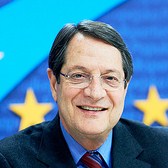 The current President of Cyprus. President from 2013 until February 2018, Mr. Anastasiades was re-elected for another 5-year term in the elections on 4th February 2018.
The current President of Cyprus. President from 2013 until February 2018, Mr. Anastasiades was re-elected for another 5-year term in the elections on 4th February 2018.
At the time of first being elected, he was the leader of the Democratic Rally or DISY. His current presidency will run until February 2023.
Political Parties
- Movement for Social Democracy United Democratic Union of Centre formerly EDEK – KISOS
- Progressive Party of Working People – AKEL
- Democratic Rally – DISY
- Democratic Party – DIKO
- European Party
- United Democrats – EDI
- Militant Democratic Movement – ADIK
- Ecological and Environmental Movement
The Council of Ministers
- Minister of Foreign Affairs
- Minister of Finance
- Minister of Interior
- Minister of Defence
- Minister of Education and Culture
- Minister of Communications and Works
- Minister of Commerce, Industry, and Tourism
- Minister of Agriculture, Natural Resources, and Environment
- Minister of Labour and Social Insurance
- Minister of Justice and Public Order
- Minister of Health
- Under Secretary to the President
- Government Spokesman
You can view the current Council of Ministers here.
Order of Precedence
The Protocol of the Republic of Cyprus Law 59(I) of 1996 regulates state protocol issues and defines the order of precedence of the Republic of Cyprus as follows:
1. The President of the Republic
2. The Archbishop of Cyprus
3. The President of the House of Representatives
4. Leaders or Representatives of Political Parties in Parliament
5. Former Presidents of the Republic
6. The Attorney General of the Republic
7. The President of the Supreme Court
8. The Members of the Council of Ministers
9. Spokesmen of the Political Parties in Parliament
10. Former Presidents of the House of Representatives
10A. Heads of Diplomatic Missions (Ambassadors/High Commissioners/ Chargé d’ Affaires)
11. Members of the House of Representatives
12. Leaders or Representatives of non-Parliamentary Political Parties
13. Members of the Supreme Court
14. The Government Spokesman
15. The Deputy Minister to the President of the Republic
16. The President of the Union of Cyprus Municipalities
17. Mayors
18. The Commander of the National Guard
19. The Chief of Police
20. The Deputy Attorney General
21. Former Ministers and Former Members of the House of Representatives
22. The Governor of the Central Bank
23. Counselors to the President of the Republic
24. Heads or Representatives of other Religious Groups
25. The Chairman and Members of the Public Service Commission
26. The Chairman and Members of the Education Service Commission
27. The Auditor-General
28. The Commissioner of Administration (Ombudsman)
29. The Permanent Secretaries of the House of Representatives, Ministries and Planning Bureau
30. The Secretary of the Council of Ministers
31. The Accountant-General
31Α. Consuls
32. Chairmen of Semi-Governmental Organizations
33. Directors-General of Semi-Governmental Organizations
34. Prefects of Administrative Districts of the Republic of Cyprus
35. Municipal Counselors
Other Governmental Information
The Supreme Court is the Judiciary to which judges are appointed jointly by the president and vice president. Northern Cyprus also has a supreme court.
The Cyprus National Anthem was chosen on 16th November 1966, by the Council of Ministers, who decided to adopt the Greek National Anthem as the National Anthem of Cyprus. Listen to the National Anthem.
Read the Cyprus Constitution (in pdf format, may not be compatible with mobile devices).
